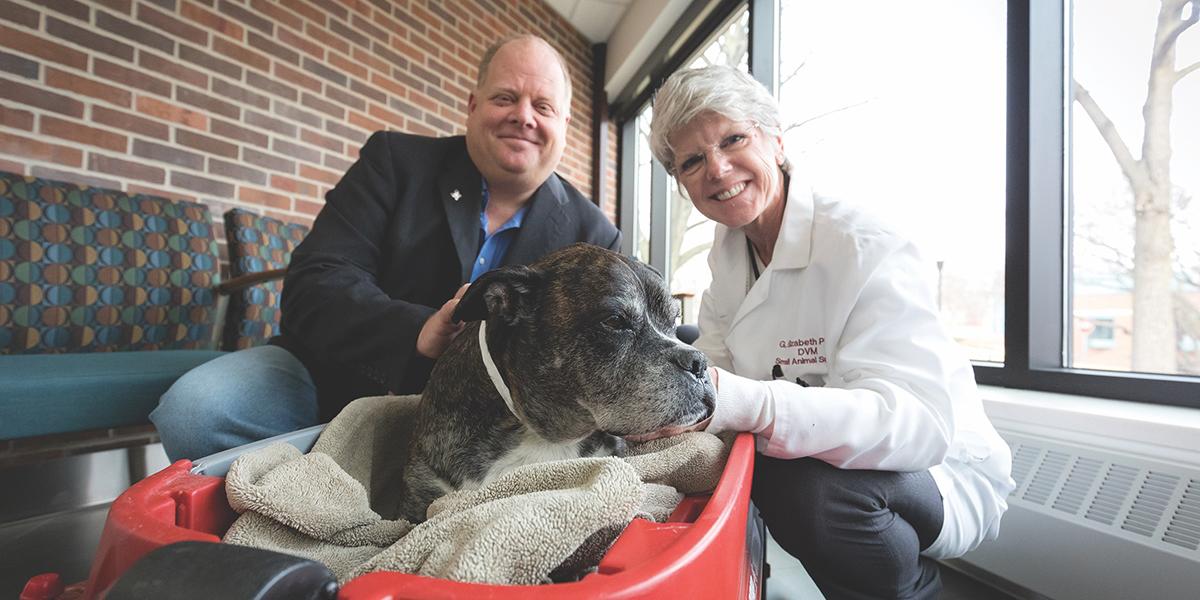- Issue:Tags:Published:Photo(s) by:Brady Willette
Physicians and scientists at the University of Minnesota have opened a new brain cancer clinical trial and have treated their first patient. This Phase I, first-in-human trial is enrolling patients with a specific type of brain cancer, glioblastoma.
The foundation for this innovative trial has roots in research conducted in partnership with the College of Veterinary Medicine (CVM). Michael Olin ’05, an associate professor of pediatric hematology and oncology, who received his PhD in infectious disease from CVM, and his research collaborator, Christopher Moertel, MD, partnered with G. Elizabeth Pluhar, DVM, PhD, DACVS, to lay groundwork for the human trial. Pluhar is the lead researcher for a high-grade canine clinical trial that has explored manipulating the immune response of glioblastomas in dogs and using it to effectively kill the tumors. The five-year canine trial began in 2017 and was funded through a $2.7 million grant from the 21st Century Cures Act by the National Cancer Institute, part of the National Institutes of Health
Although the previous approaches used in the trial were successful at extending most of the canine patients’ survival, the tumors always recurred. Olin discovered that the tumors were creating a protein, CD200, that blocks the body’s natural immune response. So, Olin manufactured peptides of the native CD200 that override the tumor’s efforts to protect itself from the body’s immune response.
“Our research found that the CD200 protein was acting as a protective shield inside a person’s brain tumor, effectively preventing the immune system or immune-directed therapy from attacking the tumor,” Olin says. “The CD200 checkpoint inhibitor that we developed, along with a proven vaccine, has shown amazing results in our tests and has the potential to have fewer adverse effects for patients.”
During the canine trial, the CD200 checkpoint inhibitor, when added to a cancer vaccine therapy, increased their canine patients’ survival time by about 18 months after diagnosis compared to vaccine therapy alone. These tumors ultimately do recur in both dogs and people, but the time to regrowth was greatly extended in the dogs that received the experimental therapy, and their quality of life during treatment was excellent.
The milestone of conducting a human clinical trial is the result of a successful collaboration between the University of Minnesota Medical School’s Division of Hematology and Oncology, its Department of Pediatrics, and CVM’s Department of Veterinary Clinical Sciences. The researchers also are members of the Masonic Cancer Center, University of Minnesota.
We have started with brain tumors, and now we plan to expand this therapy platform to melanoma, lung cancer, and other difficult-to-treat malignancies.
Christopher Moertel, MD
The Masonic Cancer Center continually conducts research to determine how cancers that occur in animals are similar to cancers that occur in people, known as comparative oncology. Researchers are then able to apply what they learn from companion animals, like dogs, to people, and vice versa, with the goal to improve the health and wellbeing of both at a rapid pace.
“We have started with brain tumors, and now we plan to expand this therapy platform to melanoma, lung cancer, and other difficult-to-treat malignancies,” Moertel says.
The single-site study opened at M Health Fairview University of Minnesota Medical Center and is being led by neuro-oncologist Elizabeth Neil, MD, Assistant Professor in the Department of Neurology at the University of Minnesota Medical School.
“As a neuro-oncologist who has dedicated my professional career to advancing therapeutic options for brain cancer patients, this combination treatment regimen could mark a landmark breakthrough in the field and be a real game-changer,” Neil says.
Each year about 12,000 Americans are diagnosed with glioblastoma, the most aggressive form of brain cancer for which there is currently no cure, according to the American Brain Tumor Foundation. Targeting CD200 could be the missing link in allowing the patient’s own vaccine-strengthened immune system to commence an all-out, unrestrained attack on the cancer cells.
“For too long has glioblastoma evaded our most innovative treatment attempts,” Neil says. “Now I believe we have the upper hand, and I am thrilled to offer this as a treatment option through our carefully developed Phase I clinical trial."








